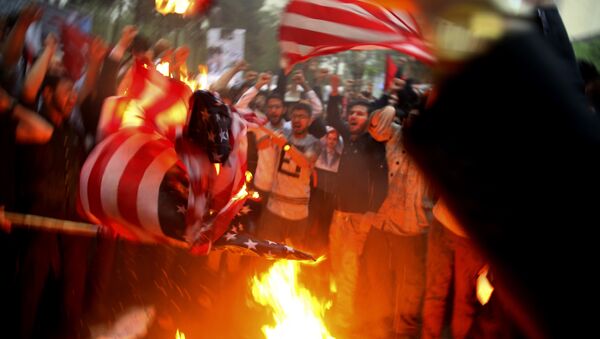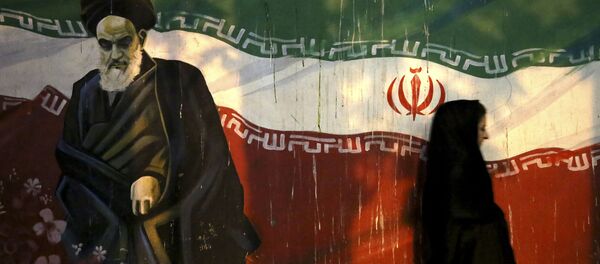Donald Trump's withdrawal from the Joint Comprehensive Plan of Action (JCPOA), commonly known as the Iran nuclear deal, has brought unexpected benefits to Russia: Crude prices have soared sharply, prompting Bank of America's Merrill Lynch firm to suggest that Brent could skyrocket to $100 per barrel.
The US president announced his decision to pull out on May 8. Although the resumption of sanctions against Tehran is likely to occur within the next six months, Trump's order has already blocked all new US-Iranian contracts and set 90 and 180-day deadlines for US companies to stop their cooperation with the Islamic Republic.
What Trump's Pullout of Iran Nuclear Deal May Lead to
According to Sputnik contributor Maxim Rubchenko, there are three possible scenarios as to how events could unfold.
First, Iran's oil market share could reduce from 3.8 million barrels per day to 1-1.5 million barrels, with crude prices mounting to $85-90 per barrel.
"This, first, would slow down China's economic growth; secondly, it will serve as an incentive for increasing production of shale oil. Third, growing geopolitical tensions will increase the demand for dollar, which will allow the US to lower the cost of borrowing — now a record one in ten years," the journalist suggested.
For its part, Israel would win in the military-political field: Being deprived of its oil profits, Tehran may reduce its activity in Lebanon and Syria.
Second, international observers foresee that the resumption of anti-Iranian restrictions in full is simply impossible. Washington's allies, French President Emmanuel Macron, German Chancellor Angela Merkel and UK Prime Minister Theresa May have issued a joint statement expressing "regret" and "concern" about Trump's decision to exit the nuclear agreement.
"Together, we emphasize our continuing commitment to the JCPOA. This agreement remains important for our shared security. We recall that the JCPOA was unanimously endorsed by the UN Security Council in resolution 2231. This resolution remains the binding international legal framework for the resolution of the dispute about the Iranian nuclear program," the statement said.
Therefore, it is expected that Washington may reconsider its decision and propose a "better deal" instead of a zero deal. Trump may either call upon Iran and the P5+1 to sign a new agreement, or announce additional postponements for European companies working with Iran. Otherwise he will face serious confrontation with his European allies.
"The exit from the Iran deal… marks the biggest rupture in transatlantic relations since the end of the Cold War and mocks the west's efforts to uphold a rules-based order," The Financial Times writes. "The US may have reneged, but Europe — and the rest of the international community — can demonstrate that they are prepared to keep the bargain with Iran — the lifting of sanctions in return for nuclear compliance."
The third scenario envisages nothing short of an all-out war in the Persian Gulf.
According to the journalist, if Iran delivers on its promise to resume the production of highly enriched weapons-grade uranium, Israel, with the support from the United States and Saudi Arabia, could attack Iranian nuclear facilities. Tehran, in turn, could resort to tit-for-tat measures and hit Israel from the Syrian territory.
Recently, Israel has repeatedly launched missile strikes on Syria, targeting Iranian positions. On May 10, Tel Aviv announced that Israel's forces had struck "nearly all the Iranian infrastructure in Syria" in response to a barrage of Iranian rockets.
Following the incident, Russian Deputy Foreign Minister Mikhail Bogdanov warned that "the current increased tensions between Israel and Iran with their exchange of rocket fire is dangerous, as it distracts from the fight against Daesh terrorists, hampers the political settlement of the situation in Syria."
"A big war in the Middle East will easily return oil prices to three-digit values," Rubchenko presumed, adding that a blockade of the Strait of Hormuz alone could slash oil supplies to the international market by 20 percent.
According to the journalist, both skyrocketing crude prices and the increase in tensions between Iran, the US and Europe plays into the hands of Moscow: On the one hand, it means additional profits to the country's budget, on the other hand, EU member states may reconsider the US-backed anti-Russia sanctions regime, as it strips them of considerable business opportunities.
The views and opinions expressed by the contributors do not necessarily reflect those of Sputnik.







